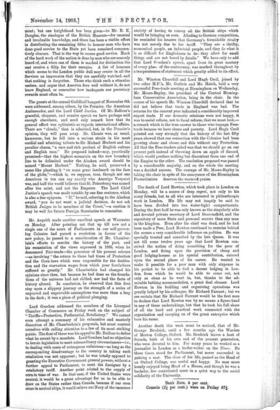Lord Goschen addressed the members of the Liverpool Chamber of
Commerce on Friday week on the subject of " Tariffs—Protective, Preferential, Retaliatory." We cannot even attempt a summary of his exhaustive and masterly dissection of Mr. Chamberlain's proposals, but must content ourselves with calling attention to a few of its most striking points. The first of these was his appeal to Mr. Balfour to define what he meant by a mandate. Lord Goschen had no objection to heroic legislation to meet extraordinary circumstances—i.e., to ;dealing with cases of outrageous unfairness—so long as the corresponding disadvantage to the country in taking suoh retaliation was not apparent ; but he was totally opposed to granting the Executive Government general powers, without a further appeal to Parliament, to meet the foreigner by a retaliatory tariff. Another point related to the supply of corn in time of war. In that case, if the United States were neutral, it would be a great advantage for us to be able to draw on the States rather than Canada, because if our corn came in neutral ships, it would relieve our Navy of the immense anxiety - of having to convoy all the British ships which would be bringing us corn. Alluding to German competition, he reminded his hearers that Germany's formidable rivalry was not merely due to her tariff. " They are a thrifty, economical people, an industrial people, and they do what it is so difficult for Englishmen to do: they allow for small things and are not bored by details." We have only to add that Lord Geschen's speech, apart from its great mastery of every phas, of the controversy, was marked throughout by a temperateness of statement which greatly added to its effect.














































 Previous page
Previous page